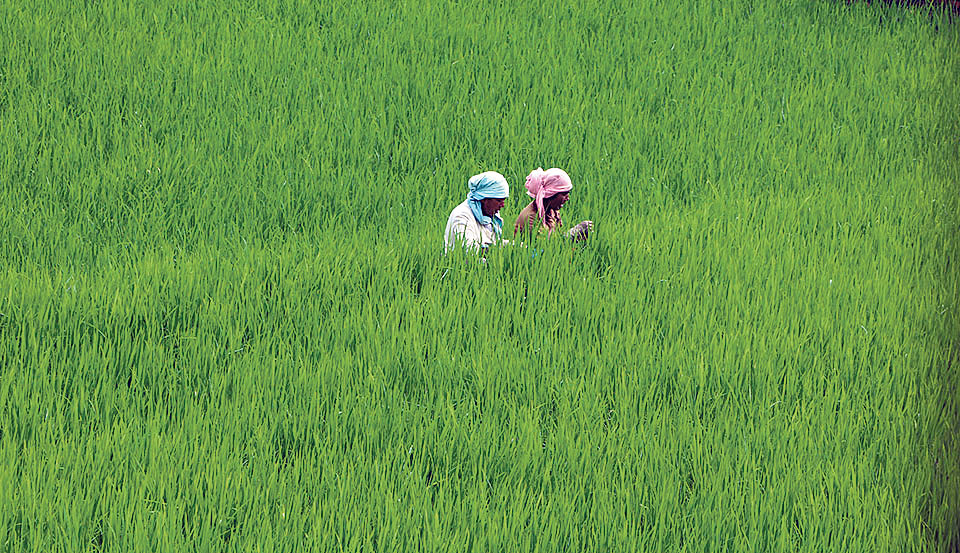
OR
Govt revises down economic growth rate to 7.01%
Published On: November 15, 2019 09:16 AM NPT By: Republica | @RepublicaNepal

KATHMANDU, Nov 15: The government has revised economic growth rate for the current fiscal year to 7.01%, down by 1.49% percentage points from its ambitious target of 8.5%.
The new growth projection was made in a report published by the Ministry of Finance. The government had set 8.5% growth target for the current fiscal year through the budget for FY2019/20.
The revised rate is still higher than the estimations made by international development partners. The World Bank, in its report entitled South Asia Economic Focus published last month, has estimated Nepal's economy to grow by 6.5% this year. Similarly, Asian Development Bank has projected the growth rate at 6.3%.
Economist Raghubir Bista said that the government could fail to achieve the targeted economic growth rate even if it managed to increase public spending. “Despite increased investment in infrastructure, capital expenditure is far below the level needed to achieve the ambitious growth target,” said Bista.
In the first three months of this year, the government was able to spend only Rs 18.36 billion which is mere 4.41% of Rs 408 billion allocated for the development works in the current fiscal year. Similarly, the possible downfall in agricultural production this year is likely to hit the government's targeted growth rate, according to the ministry officials.
In FY2018/19, the country's economy had expanded by 7% driven by the agriculture sector, paddy production in particular. Agriculture production contributes 27% to the country's GDP, according to Economic Survey 2018/19.
However, paddy production is expected to go down by around 8% this year as per the estimation of the Ministry of Agriculture and Livestock Development. According to the ministry, paddy crop was hit by a series of misfortunes ranging from delayed monsoon, fertilizer shortage and supply of faulty seeds to an armyworm invasion.
Nepali farmland largely depends on the monsoon rain. But the delayed monsoon coupled with below-normal rainfall has affected paddy transplantation in the main season that lasts from June to September. As a result, paddy was transplanted in only 1.30 million hectares of land out of 1.37 million hectares of total paddy fields.
Paddy transplantation this year was also hit by the shortfall of chemical fertilizers. According to the ministry, it had planned to distribute 286,000 tons of chemical fertilizers to farmers this year. But it could purchase only 227,000 tons due to the appreciation of the US dollar and price surge in the global market.
In addition, more than 700 hectares of paddy fields have been reported to be affected in the far western districts of Kailali and Kanchanpur alone due to use of faulty seeds of Garima brand. Kailali and Kanchanpur are among the main paddy producing districts of the country.
The performance of Nepali economy is dependent on the farm sector. According to the Central Bureau of Statistics, the country's GDP expanded by 7.74% in FY2016/17 – the highest since FY1993/94, largely due to an above-normal monsoon that helped Nepal to secure the biggest paddy harvest of 5.23 million tons.
Likewise, the economy grew by 6.3% in the following year, i.e. FY2017/18, in which paddy output was recorded at 5.15 million tons.
You May Like This

WB lowers Nepal’s economic growth projection at 5.1 percent for the current FY
KATHMANDU, Jan 12: The World Bank (WB) has projected the economic growth rate of Nepal to stand at 5.1 percent... Read More...

World Bank projects Nepal’s growth rate to be 2.7 percent in current FY
KATHMANDU, April 1: The World Bank (WB) has projected that Nepal will grow by 2.7 percent in the current fiscal year,... Read More...

Govt should prioritize Miss Nepal: Miss Nepal Shrinkhala Khatiwada
MAKWANPUR, April 24: Newly crowned Miss Nepal World 2018, Shrinkhala Khatiwada has urged the government to prioritize the pageant as... Read More...










Just In
- Heavy rainfall likely in Bagmati and Sudurpaschim provinces
- Bangladesh protest leaders taken from hospital by police
- Challenges Confronting the New Coalition
- NRB introduces cautiously flexible measures to address ongoing slowdown in various economic sectors
- Forced Covid-19 cremations: is it too late for redemption?
- NRB to provide collateral-free loans to foreign employment seekers
- NEB to publish Grade 12 results next week
- Body handover begins; Relatives remain dissatisfied with insurance, compensation amount







Leave A Comment